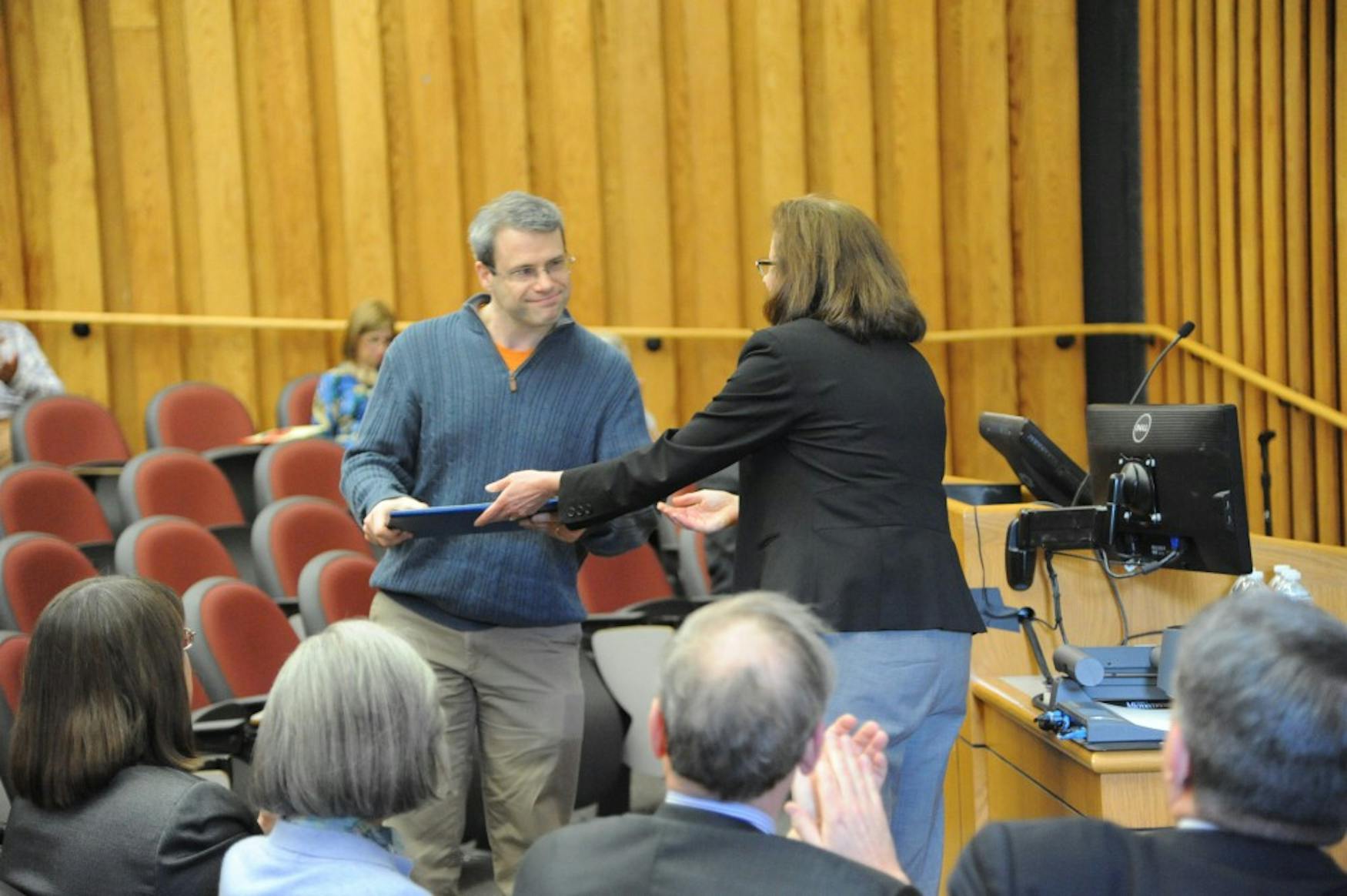Lawrence will receive paid sabbatical for one year
Chairman of the Board of Trustees Perry Traquina ’78 announced at Thursday’s faculty meeting that University President Frederick Lawrence will receive paid sabbatical for fiscal year 2015, continued housing in the Watch Factory and full salary for nine months post-sabbatical as part of his end-of-presidency compensation. Lawrence began the meeting by calling everyone to order and recognizing the four board members in attendance: Barbara Mandel, George Krupp, Larry Kanarek ’76 and Traquina.
The audience then recognized the 2015 Giumette Academic Achievement Award Recipients: Zoe Brown ’17, Hatice Guc ’17, Myung Joo Khang ’17, Kahlil Oppenheimer ’17 and Leah Shapiro ’17. The faculty then recognized teaching award recipients. Profs. Isaac Krauss (CHEM) won the Michael L. Walzer ’56 Award for Teaching, Jennifer Cleary (THA) won the Louis D. Brandeis Prize for Excellence in Teaching, Jané Kondev (PHYS) won the Jeanette Lerman-Neubauer ’69 Prize for Excellence in Teaching and Mentoring and Eva Bellin (POL) won the Dean’s Mentoring Award.
Interim Dean of the Heller School for Social Policy and Management Marty Krauss then presented the teaching and mentoring awards for the Heller school. Profs. Brenda Anderson (Heller, IBS) won the Teaching Award in Heller, while Laurie Nsiah-Jefferson (Heller) won the Mentoring Award in Heller. Additionally, Prof. Leanne Bateman (Rabb) won the Rabb School of Continuing Studies Outstanding Teaching Award.
Lawrence then took the podium for a brief president’s report. He began by introducing Judy Glasser, who was recently appointed as the interim senior vice president for communications. Lawrence also thanked those who helped during Admitted Students Day, noting that this year’s group of applicants is the largest in the history of the University. Lawrence then left the room as the faculty and administrators transitioned into a discussion on the end of presidency benefits he will be receiving.
Traquina displayed a PowerPoint that outlined the University’s finances and the size of its staff and salaries in relation to what Traquina called “peer universities,” or colleges of similar size and stature. The 28 schools Traquina listed included Boston University, Lehigh University, Middlebury College and Vassar College.
According to the PowerPoint, Lawrence’s total compensation for 2014 was $1,004,593, which was up less than one percent for the calendar year. Previously, in 2013 his compensation was $996,492, and in 2012 was $956,499.
Additionally, he noted, $4.9 million for fiscal year 2013 were set aside to pay the compensation of 15 University executives, and the total compensation made to executives from 2008 to 2009 to 2014 to 2015 represents between 1.58 percent and 1.55 percent of the University’s financial intake structure in any given year.
The PowerPoint also compared the University’s faculty size to other universities, noting that Brandeis has approximately 200 faculty members per 1,000 students, as compared to 350 faculty members per 1,000 students for similar schools.
“We would like to do more, but we also have the pressures of size of endowment, operating deficits, trying to raise faculty salaries … [and] I think we have some priorities that are higher,” Traquina said.
Traquina also discussed the end of presidency benefits and responsibilities that the University will confer on Lawrence. According to the PowerPoint, Lawrence will be on paid sabbatical for fiscal year 2015. During this time, the University will continue to house Lawrence in the Watch Factory, and he will continue to receive his salary for nine months following the end of his sabbatical. Additionally, Lawrence will be required to continue to cooperate with recruiting and assisting the new president and will be instrumental in future fundraising initiatives.
Next, Traquina opened up the floor for discussion. Prof. Sabine von Mering (GRALL) asked, “Is there ever actually a conversation about [faculty size and salaries] when these values are decided?”
“How do you get a great person to come here if you’re not going to pay them a competitive wage?” Traquina countered.
After some further discussion, the faculty moved on to the next point of order, and Kanarek stood at the podium to give updates on the ongoing efforts of the Presidential Search Committee, of which he is the chair. Kanarek discussed how the committee will discuss Lawrence’s transition from the University to potential candidates.“We have to remember that we are selling just as much as we are buying,” he said. “I think what we’re going to have to do in the next few months is decide what we have to offer."
Kanarek then discussed how, despite rising tuition prices, the University is in need of more funds to function most effectively, which he said the new president will likely work on as one of his or her initiatives.“We are overdrawing the endowment we have more than we should,” Kararek said.
Kanarek turned the microphone over to Prof. Thomas Pochapsky (CHEM) for his report on the Faculty Senate. Pochapsky discussed the Faculty Senate’s brief meeting with Provost Lisa Lynch about interim appointments in Heller, also discussing the upcoming faculty Senate elections, for which ballots come out later this week.
Lynch then took the podium for her provost’s report. She began by thanking those who put in proposals for teaching and research innovation rewards, noting that a total of over $5.5 million of funding was requested, and $500,000 had been set aside for rewards.




Please note All comments are eligible for publication in The Justice.